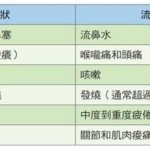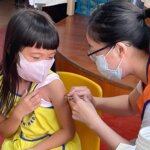Influenza vaccine is an inactivated vaccine made from dead viruses, therefore, influenza vaccine is not a cause of influenza infection. After vaccination, there may be soreness, redness and swelling at the injection site, and in a few people, there may be mild systemic reactions, such as fever, headache, muscle aches, nausea, itchy skin, hives or red rash, etc. Usually, they will recover naturally within 1 to 2 days after the onset of the symptoms.
As with any medication, although rare, the flu vaccine can cause serious side effects such as an immediate allergic reaction or even anaphylactic shock (clinical signs include difficulty breathing, hoarseness, wheezing, swelling of the eyes or lips, dizziness, rapid heartbeat, etc.). (clinical manifestations include difficulty breathing, hoarseness, wheezing, swelling of the eyes or lips, dizziness, rapid heartbeat, etc.), and if this happens, symptoms usually appear within a few minutes to a few hours after inoculation. Other sporadically reported adverse events include neurological symptoms (e.g. brachial plexus, facial nerve paralysis, heat cramps, encephalomyelitis, symmetric neuromalacia). Adverse events that have been sporadically reported include neurological symptoms (e.g. brachial neurosclerosis, facial nerve palsy, heat cramps, encephalomyelitis, GBS with symmetric neurasthenia, etc.) and hematological symptoms (e.g. temporary low platelet counts, with clinical manifestations such as purplish or hemorrhagic dots on the skin and difficulty in stopping bleeding). In addition to the 1976 swine influenza vaccine, the 2009 H1N1 novel influenza vaccine, and some seasonal influenza vaccines that have been shown to be associated with GBS by epidemiologic studies, the H1N1 vaccine has been shown to be associated with GBS. With the exception of the 1976 swine influenza vaccine, the new 2009 H1N1 influenza vaccine, and some seasonal influenza vaccines, which have been confirmed in epidemiologic studies to be associated with GBS, there is little statistical evidence to support an association with influenza vaccination. In addition, the results of existing studies and the reports of the World Health Organization show that inactivated influenza vaccination in pregnant women does not increase the risk of adverse pregnancy and fetal events.
Points to note after inoculation
In order to immediately deal with severe allergic reactions of the immediate post-inoculation type, which have a very low incidence, you should take a short break in or near the flat after inoculation and observe the area for at least 30 minutes before leaving the flat.
For those who use antiplatelet or anticoagulant drugs or have abnormal coagulation function, apply pressure to the injection site for at least 2 minutes after the injection and observe whether there is still bleeding or hematoma.
If there is persistent fever, severe allergic reaction such as difficulty in breathing, shortness of breath, dizziness, accelerated heartbeat, etc. after vaccination, consult a doctor as soon as possible and report to the local Health Bureau or the Department of Disease Control by phone.
Although the chance of contracting influenza can be lowered after vaccination, there is still a possibility of contracting influenza, and the public still needs to pay attention to health care and various preventive measures in order to maintain their health.
Within 48 hours of receiving the influenza vaccine, about 1-2% may have a fever reaction, and the doctor should be informed that the vaccine has been administered for diagnostic reference. If fever persists 48 hours after vaccination, there may be other infections or causes of fever.





